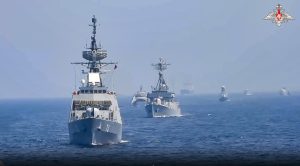The People’s Liberation Army Navy (PLAN), Russian Federation Navy, and Iranian naval forces (the Islamic Republic of Iran Navy and Navy of the Islamic Revolutionary Guard Corps) conducted the fifth iteration of the Sea Security Belt exercise from March 11-15. The five-day trilateral exercise focused on coordinated maritime security training. This year’s at-sea phase included PLAN Type 052D guided missile destroyer Urumqi successfully commanding a combined six-warship PLAN and Iranian task force in the boarding and freeing of a captured civilian vessel. With all three ships of the 45th Escort Task Force taking part, it marked the most significant PLAN force participating in a Sea Security Belt exercise.
The increased PLAN presence in last week’s exercise is part of Beijing’s renewed naval diplomacy with the Escort Task Forces post-COVID.
Escort Task Forces have conducted 21 naval engagements (exercises and or port visits) since the end of “zero COVID” ended in late 2022. 2023 saw a return to 2018 activity levels, when task forces conducted an average of 6.67 naval engagements per deployment. After 2018, there was a decline in such operations, possibly associated with the opening of the PLA base in Djibouti and the changing international environment.
Historically, Escort Task Forces made port visits, participated in exercises or ceremonial events, and supported senior leader engagements as part of Beijing’s naval diplomacy. This subset of military diplomacy sought to strengthen China’s bilateral or multilateral military relations and goodwill globally. China’s global naval diplomacy using Escort Task Forces peaked between 2014 and 2018 when ships conducted on average almost seven engagements and deployments, with occasional task forces visiting seven or more countries.
Beijing began reducing Escort Task Force naval engagements in late 2018. Although some forces, like the 32nd Escort Task Force (which had seven naval engagements in Europe and Asia), still conducted wide-ranging naval diplomacy, such operations became less frequent.
Naval engagement further declined during COVID-19 as Escort Task Forces only participated in a few exercises.
The 42nd Escort Task Force’s visit to Richardson Bay, South Africa, and participation in a 10-day exercise with the Russian Federation Navy and South African Navy in early 2023 marked the shift in naval diplomacy. In 2023, Escort Task Forces conducted a combined 20 naval engagements (mainly port visits) throughout the Global South.
In total, 45 percent of China’s naval engagements in 2023 were with African nations. This focus likely sought to complement Chinese foreign policy efforts and demonstrate continued commitment to Sino-African military cooperation post-COVID-19.
The remainder of the 2023 naval engagements occurred in the Middle East and along the maritime route to the region. Given Beijing’s increased role in the Middle East, these engagements also likely complemented ongoing foreign policy. Concurrently, such activity possibly helped bolster strategic access for the PLAN. Maintaining good military relations and access to key ports along the route to the Middle East likely fosters a more favorable operating environment for the PLAN.
Increased Escort Task Force naval engagement will likely continue through 2024, especially given current global maritime challenges. This instability underscores the importance of naval diplomacy to Beijing. Escort Task Force engagements enable the PLAN to strengthen naval relations and trust throughout regions critical to China. Such a favorable environment is essential to China’s development and the PLAN’s ability to protect it.

































